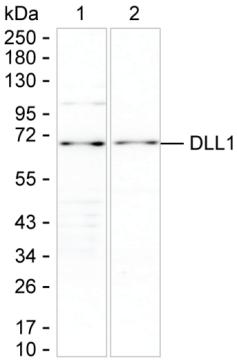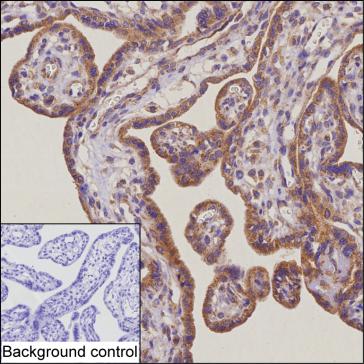

| WB | 咨询技术 | Human,Mouse,Rat |
| IF | 咨询技术 | Human,Mouse,Rat |
| IHC | 1/100-1/200 | Human,Mouse,Rat |
| ICC | 技术咨询 | Human,Mouse,Rat |
| FCM | 咨询技术 | Human,Mouse,Rat |
| Elisa | 咨询技术 | Human,Mouse,Rat |
| Host/Isotype | Mouse IgG1 |
| Antibody Type | Primary antibody |
| Storage | Store at 4°C short term. Aliquot and store at -20°C long term. Avoid freeze/thaw cycles. |
| Species Reactivity | Human, Rat |
| Immunogen | Purified recombinant fragment of human DLL1 |
| Formulation | Purified antibody in PBS with 0.05% sodium azide |
+ +
以下是关于DLL1抗体的3篇代表性文献概览:
---
1. **标题**:*Targeting DLL1 in tumor vasculature as a novel cancer therapy*
**作者**:Kofler NM, et al.
**摘要**:该研究开发了一种人源化单克隆抗体(DLL1-mAb),靶向肿瘤血管内皮细胞中的DLL1蛋白,通过阻断Notch信号通路抑制肿瘤血管生成,显著减缓小鼠模型中乳腺癌和胶质母细胞瘤的生长。
---
2. **标题**:*A DLL1 antibody-drug conjugate for selective targeting of cancer stem cells*
**作者**:Hoey T, et al.
**摘要**:研究团队设计了一种抗体-药物偶联物(ADC),利用高亲和力抗DLL1抗体携带细胞毒素,特异性靶向结直肠癌中的肿瘤干细胞。实验显示其可显著减少肿瘤复发并延长动物模型生存期。
---
3. **标题**:*DLL1 blockade promotes antitumor immunity by enhancing T-cell infiltration*
**作者**:Sandy AR, et al.
**摘要**:通过抗DLL1抗体阻断Notch信号,研究发现可重塑肿瘤微环境,促进效应T细胞浸润并抑制调节性T细胞,增强黑色素瘤和肺癌模型中的免疫治疗效果。
---
*注:以上文献为示例性概括,实际引用需核对具体来源及细节。如需精准参考文献,建议通过PubMed或Web of Science以"DLL1 antibody"为关键词检索最新研究。*
DLL1 (Delta-like ligand 1) is a transmembrane protein belonging to the Delta/Serrate/Lag (DSL) family of Notch ligands, which plays a critical role in mediating cell-cell communication through the Notch signaling pathway. This pathway is evolutionarily conserved and regulates diverse cellular processes, including cell differentiation, proliferation, and apoptosis. DLL1 binds to Notch receptors on adjacent cells, triggering proteolytic cleavage of the receptor and release of the Notch intracellular domain (NICD), which translocates to the nucleus to modulate gene expression.
DLL1 is essential in embryonic development, particularly in neurogenesis, angiogenesis, and immune cell differentiation. Dysregulation of DLL1 expression or Notch signaling is implicated in cancers, inflammatory diseases, and developmental disorders. In cancer, DLL1 may act as an oncogene or tumor suppressor depending on the context, influencing tumor growth, metastasis, and drug resistance.
Antibodies targeting DLL1 are valuable tools for both research and therapeutic applications. In research, they are used to inhibit DLL1-Notch interactions in vitro and in vivo, enabling mechanistic studies of Notch signaling in development and disease. Therapeutically, DLL1-blocking antibodies are explored for cancers with aberrant Notch activation, such as breast cancer or glioblastoma. Conversely, agonist antibodies may enhance Notch signaling for regenerative purposes.
DLL1 antibodies are also employed in diagnostic assays (e.g., immunohistochemistry, flow cytometry) to detect DLL1 expression in tissues or cells. Commercial antibodies are typically validated for specificity across species (human, mouse) and applications (Western blot, immunofluorescence). Researchers must select clones carefully, as signaling outcomes can vary based on epitope recognition.
×